Renewable Energy
Renewable energy refers to energy that is collected from resources that are naturally replenished on a human timescale, such as sunlight, wind, rain, tides, waves, and geothermal heat. Unlike non-renewable energy sources like fossil fuels, renewable energy sources are sustainable and have a lower environmental impact.
Sources of Renewable Energy
- Solar Energy: Solar panels convert sunlight into electricity through the photovoltaic effect.
- Wind Energy: Wind turbines convert the kinetic energy of the wind into mechanical power or electricity.
- Hydropower: Energy is generated from the movement of water, usually from dams or flowing rivers.
- Geothermal Energy: Heat from the Earth's core is used to generate electricity or heat buildings.
- Biomass: Organic materials such as wood, agricultural residues, and municipal solid waste can be burned to produce heat or electricity.
- Ocean Energy: Energy can be harnessed from the motion of ocean waves and tides.
Importance of Renewable Energy
Renewable energy plays a crucial role in the transition to a sustainable and low-carbon future. It offers several important benefits:
- Environmental Benefits: Renewable energy sources produce minimal greenhouse gas emissions and reduce air and water pollution compared to fossil fuels.
- Energy Security: By diversifying the energy mix, reliance on finite and imported resources is reduced, enhancing energy security.
- Economic Opportunities: The renewable energy sector creates jobs and supports economic growth, with potential for innovation and technological advancements.
- Climate Change Mitigation: The use of renewable energy helps mitigate the impacts of climate change by reducing overall carbon emissions.
Study Guide
Key Concepts
- Definition of renewable energy
- Examples of renewable energy sources
- Comparison of renewable energy to non-renewable energy sources
- Environmental and economic benefits of renewable energy
Discussion Points
- How does solar energy work, and what are the advantages and limitations of solar power?
- What are the environmental impacts of hydropower, and how can they be mitigated?
- Discuss the potential for innovation and growth in the wind energy sector.
- Compare the costs and benefits of using biomass for energy production.
By understanding the principles and applications of renewable energy, we can contribute to the sustainable development and responsible use of natural resources for future generations.
.◂Biology Worksheets and Study Guides High School. Genetics and heredity II
Worksheet/Answer key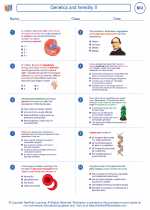 Genetics and heredity II
Genetics and heredity II  Worksheet/Answer key
Worksheet/Answer key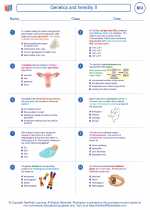 Genetics and heredity II
Genetics and heredity II  Worksheet/Answer key
Worksheet/Answer key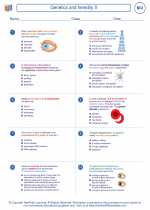 Genetics and heredity II
Genetics and heredity II  Vocabulary/Answer key
Vocabulary/Answer key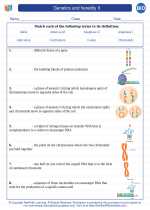 Genetics and heredity II
Genetics and heredity II  Vocabulary/Answer key
Vocabulary/Answer key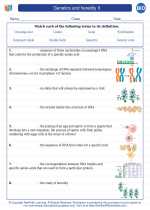 Genetics and heredity II
Genetics and heredity II  Vocabulary/Answer key
Vocabulary/Answer key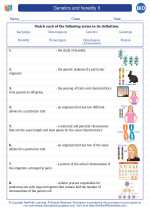 Genetics and heredity II
Genetics and heredity II  Vocabulary/Answer key
Vocabulary/Answer key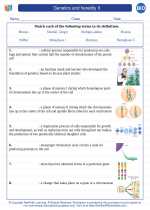 Genetics and heredity II
Genetics and heredity II  Vocabulary/Answer key
Vocabulary/Answer key Genetics and heredity II
Genetics and heredity II  Vocabulary/Answer key
Vocabulary/Answer key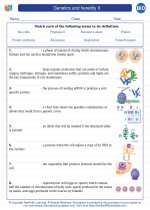 Genetics and heredity II
Genetics and heredity II  Vocabulary/Answer key
Vocabulary/Answer key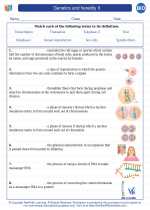 Genetics and heredity II
Genetics and heredity II 

 Worksheet/Answer key
Worksheet/Answer key
 Worksheet/Answer key
Worksheet/Answer key
 Vocabulary/Answer key
Vocabulary/Answer key
 Vocabulary/Answer key
Vocabulary/Answer key
 Vocabulary/Answer key
Vocabulary/Answer key
 Vocabulary/Answer key
Vocabulary/Answer key
 Vocabulary/Answer key
Vocabulary/Answer key
 Vocabulary/Answer key
Vocabulary/Answer key
 Vocabulary/Answer key
Vocabulary/Answer key

The resources above cover the following skills:
LIFE SCIENCE (NGSS)
Heredity: Inheritance and Variation of Traits
Students who demonstrate understanding can:
Ask questions to clarify relationships about the role of DNA and chromosomes in coding the instructions for characteristic traits passed from parents to offspring.